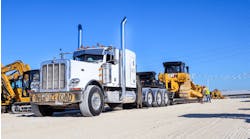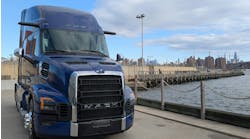In an effort to curb climate change and improve the economy through the creation of clean technology jobs, the governors of 15 states, as well as the mayor of Washington D.C., have agreed to a pact that calls for only new medium- and heavy-duty zero-emission trucks and buses to be sold in their jurisdiction by 2050. They set a 30% goal of zero emission commercial vehicles by 2030, which will be reassessed in 2025 as new data comes in.
Called the Multi-State Medium- and Heavy-Duty Zero-Emission Vehicle Memorandum of Understanding (MOU), it as been signed by the governors of California, Colorado, Connecticut, Washington, D.C., Hawaii, Maine, Maryland, Massachusetts, New Jersey, New York, North Carolina, Oregon, Pennsylvania, Rhode Island, Vermont and Washington. It is also not legally binding.
Over the next six months, the signatories will develop a multi-state action plan to increase the feasibility of zero emission vehicles, such as battery-electric trucks, which currently are more costly than diesel and gasoline-powered trucks and lack a comprehensive fueling/charging infrastructure.
According to the MOU, a Multi-State ZEV Task Force will address: financial and non-financial incentives related to vehicles and infrastructure, deployment strategies, outreach and education, how to work with utilities, weight restrictions, data standards and more.
Disadvantaged communities were specifically mentioned as an area of focus, as the agreement noted they “have been historically burdened with higher levels of air pollution.”
The same day, Joe Biden, the former vice president and presumptive Democratic nominee for president in the upcoming November election, announced a $2 trillion climate change action plan that would create millions of jobs and prevent catastrophic climate-induced destruction. By 2035, the Biden plan aims to eliminate carbon emissions from the power sector.
“Science tells us we have nine years before the damage is irreversible,” Biden said in a speech promoting his plan. He also attacked the president, his opponent in the upcoming election, for questioning climate change data and its impact on humanity.
“When Donald Trump thinks about climate change, the only word he can muster is ‘hoax,’” Biden said. “When I think about climate change, the word I think of is ‘jobs.’”
The Diesel Technology Forum (DTF), the organization representing diesel engine and equipment manufacturers, disagreed with the 15-state MOU and Biden’s plan to “power clean energy revolution in this country,” as they make the choice between fossil fuel and electrification a binary one.
“While the recently announced MOU takes a long view for commercial trucks in the region to be all electric, there are equally important proven and available near-term opportunities to advance progress for cleaner air and lower greenhouse gas emissions right now,” DTF executive director Allen Schaeffer said. “Rapidly accelerating the turnover of the existing fleet to the newest generation of diesel technology as well as expanding the use of low-carbon advanced biofuels can deliver benefits today, and should not be overlooked.”
He pointed to the dramatic emissions improvements the U.S. has seen since fleets have adopted emissions reducing technology in trucks.
“Since 2010, a new generation of diesel technology has become the standard for heavy-duty trucks, delivering reductions of 98% of emissions of particulate matter and nitrogen oxide emissions,” Schaeffer said. “Getting more of this generation of vehicle into the hands of truckers now will pay large benefits in terms of lower emissions of nitrogen oxides and particulate matter, particularly trucks operating in the most sensitive communities.”
Emissions should naturally decrease under current market conditions, as currently 43% of diesel-powered commercial vehicles are Model Year 2010 or newer and have the mandated emissions-treating components. The DTF noted that means “57% are of an older generation that have higher emissions and lower fuel efficiency, making the opportunity for accelerating turnover substantial.”
Schaeffer believes there is one quick way to get more new diesel trucks— equipped with selective catalytic reduction (SCR) and particulate control technologies— on the road, and therefore make the environment cleaner quicker.
“One policy solution to help encourage the adoption of new cleaner trucks now is to temporarily suspend the federal excise tax on truck purchases," said Schaeffer. "Given the average $150,000 price for a new Class 8 tractor, the 12% federal excise tax inflates the delivered price of a new truck and is a leading contributor to an aging and less efficient truck fleet. A tax holiday on truck sales through 2021 is a powerful option to encourage truck owners to replace less efficient models with new options to help deliver immediate term clean air and climate benefits. According to a recent survey, 60% of trucking fleets indicated they would consider buying more new trucks if the excise tax was suspended.”




